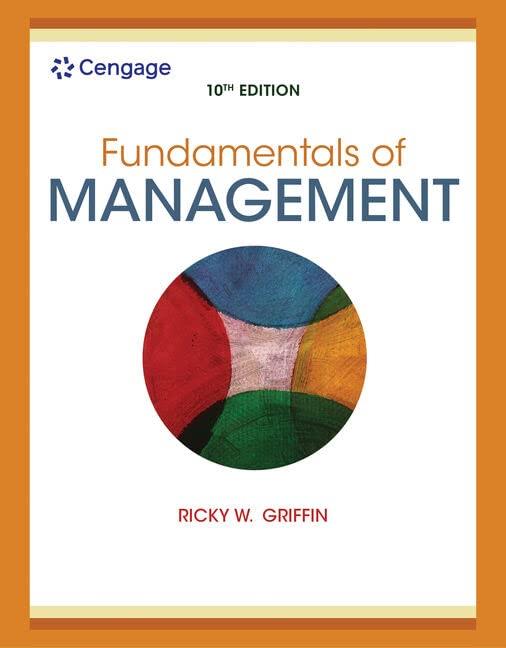Question
1. Please identify what you think are the most significant ethical values at stake in Ben's decision. It will be important to identify these values
1. Please identify what you think are the most significant ethical values at stake in Ben's decision. It will be important to identify these values on all sides of this dilemma.
2. What struck you as the most important aspect or element of this case study and why did it stand out to you?
3. a. Identify the ethical principles involved
b. Review or analyze the problem using one of the ethical principles outlined below:
Ethic of self-interest
Ethics of personal virtues
Ethic of Caring
Ethic of utilitarian benefits
Ethics of universal rules
Ethics of individual rights
Ethic of justice
c. Examine the problem from an ethical perspective different from the one(s) used initially
A Business Ethics Case Study-
Background
Ben is an experienced sales representative at a large multinational information technology company. He's worked there for years and has developed strong friendships within the company, especially with other sales reps. Ben has been good friends with Michael, another sales rep since they joined the company around the same time.
Over the last months, Michael shared some personal struggles with Ben, and Ben was doing his best to be a supportive friend. Ben knew that Michael was dealing with some serious financial issues at home and that he was barely making ends meet, trying to support his wife and young kids while also having to financially support his aging parents. Michael let on that he was taking some risky moves at work to come up with some more money and that he was really starting to worry about it. But he never fully disclosed what that entailed.
Unexpectedly, Michael abruptly left the company, leaving Ben shocked and suspicious about the true nature of his colleague's activities. Ben was assigned to take over Michael's sales territories and get back on track. During the transition, he discovered the extent of the financial harm that the company suffered as a result of Michael's actions. Through careful examination of sales transactions and accounting records, it became evident that Michael had engaged in a fraudulent scheme. Michael had orchestrated a deal with an external company whereby he booked a large number of orders with delayed delivery dates. He received upfront commission payments (meaning he was paid the commission when the sale was made but not when the order was fulfilled) by his own company for nearly one hundred orders, and then split that commission with the external company. In collaboration with the external firm, Michael continuously pushed back the delivery dates every few months, ensuring the orders were never fulfilled. Despite the absence
of payment from the external company, the tech company continued paying commissions to Michael for these fictitious sales. Essentially, Michael was being compensated for sales that
were listed as orders but that was never actually fulfilled (payment for the sale was due on delivery).
Reflecting on their past conversations, Ben grew increasingly uneasy, realizing that Michael's desperate need for quick money through sales commissions had likely driven him to engage in this fraudulent behavior. Ben felt a sense of responsibility and questioned whether he could have prevented the situation, and now, with Michael gone from the company with no repercussions, he wondered what all of this would mean for him.
As Ben assumed the responsibility of taking over Michael's sales territory, the company began an internal investigation to seek any information that could shed light on the issue. This presented Ben with a moral dilemma. During the investigation, Ben was asked if he knew any information that might help the company understand and resolve the issue. Michael's actions - the deceit, dishonesty, and disregard for responsibility - deeply troubled Ben as they clashed with his own moral compass.
While Ben wanted to uphold his personal integrity as an individual and an employee and disclose all he knew to the company, he worried that doing so might jeopardize his own position and potentially lead to termination if he were deemed complicit in Michael's actions.
Additionally, Ben empathized with Michael's difficult circumstances, understanding that he only resorted to fraud out of desperation. A part of him felt inclined to protect his friend and maintain their friendship, despite the wrongdoings committed. Feeling caught between conflicting interests, Ben wondered: should he choose to remain silent and move on as quickly as possible, now that Michael has left the company, and avoid giving any information? After all, exposing the truth could lead to serious consequences for Michael, who was already dealing with significant challenges. It could also cost Ben his friendship. But,
even if the fraud was wrong, Ben knew his huge company wouldn't really feel a big financial hit from the loss and that the product in question was not a life or death matter. Not every wrong can or even should be righted, Ben thought. Moreover, his job and his reputation as a sales rep and his company's image might all be at stake if he speaks up.
Step by Step Solution
3.55 Rating (152 Votes )
There are 3 Steps involved in it
Step: 1
1 Ethical Values at Stake Honesty and Integrity Ben faces a dilemma between disclosing the truth about Michaels fraudulent actions and protecting his ...
Get Instant Access to Expert-Tailored Solutions
See step-by-step solutions with expert insights and AI powered tools for academic success
Step: 2

Step: 3

Ace Your Homework with AI
Get the answers you need in no time with our AI-driven, step-by-step assistance
Get Started


